- Author Adrian Jeff jeff@psychologosportal.com.
- Public 2023-12-17 05:06.
- Last modified 2025-01-24 14:09.
Ingmar Bergman's film "Autumn Sonata" - system analysis
Systemic cinema is the embodiment of the meaning "spied on life" by the director in his work. And for the viewer, this is always a real inner work, emotional in the first place, and, of course, intellectual.
After the seminars and trainings "System-Vector Psychology" by Yuri Burlan, I began to be more selective in choosing a movie to watch. Now, from the first shots, you can understand for yourself whether it is worth watching this film or not. It is immediately clear whether the cinema carries the "truth of life", reveals deep life meanings, or is it nothing more than a waste of time, an empty fantasy of an individual viewer of a not very high level of development, an attempt to replace reality, empty idleness …
Systemic cinema is the embodiment of the meaning "spied on life" by the director in his work. And for the viewer, this is always a real inner work, emotional in the first place, and, of course, intellectual.
When you watch such a movie, you live with the heroes their life scenarios, you go through certain situations with them, systematically understanding why everything develops in their lives this way and not otherwise.
One of my recent discoveries in the film world was Ingmar Bergman's film "Autumn Sonata", which very accurately reveals the psychology of the relationship between the anal-visual daughter (Eve) and the skin-visual mother (Charlotte).
At the same time, Eve's mother, Charlotte, is shown in the film as just such a skin-visual mother, the relationship with whom the anal-visual daughter has and results in a life-long “resentment against the mother” scenario.
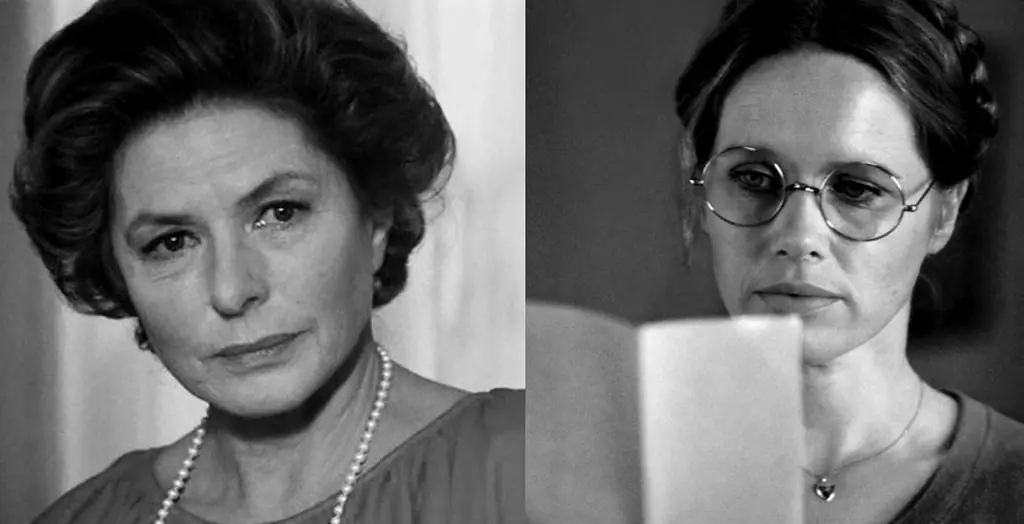
Charlotte is a real skin-visual female
She is a fairly well-known pianist who lives a vibrant, turbulent life. Success on stage. Crowds of fans behind the scenes. Charlotte's whole life is a real kaleidoscope of successive pictures: new countries, new novels. Charlotte spends little time at home with her family; she is practically not involved in raising her daughter. Skin-visual Charlotte is constantly preoccupied with her appearance, has a weakness for expensive beautiful things.
The mother comes to her adult daughter, having buried her next lover, and this decision - to come to her daughter - was made by her under the influence of the moment: Charlotte is tormented by the fear of loneliness, she needs attention, viewers, so she, without hesitation, decides to take advantage of her daughter's invitation to visit her. Despite the fact that they have not communicated with each other for 7 years.
Literally from the doorway, the mother brings down her feelings about the death of another lover on her daughter, and ends her story with the words: “I naturally lack him, but I can't bury myself alive,” and immediately switches to a demonstration of outfits: “What do you think, I have not changed much over the years? I dye my hair, of course, but I'm holding on … Do you like my new suit? I went in, tried it on - as it was sewn on me; true, elegant and inexpensive. " A very systemic detail is how Charlotte asks about her daughter's personal life: "I hope you haven't locked yourself in four walls?" Well, this is how she sees through herself - for a skin-visual woman there is nothing worse than locking herself in four walls.
Anal-visual Eve
The daughter's image is also very systemic, Eve is clearly shown as an anal-visual woman. Eva tells her mother about her life, that she and her husband do charity work, and occasionally plays the piano in church.
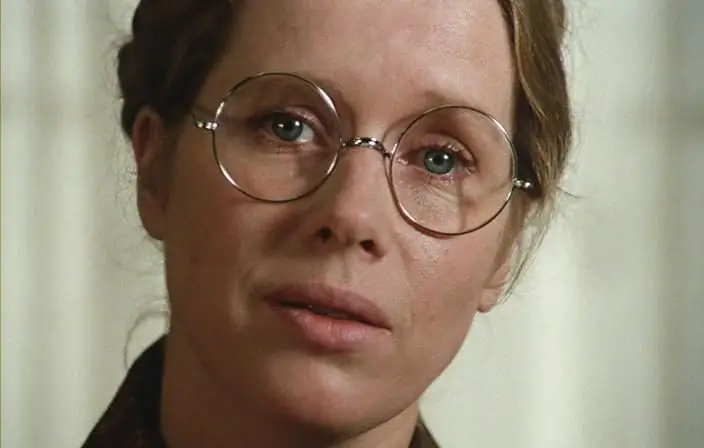
Unlike her mother, she does not pay much attention to her appearance. She has a slightly awkward, swaying gait. She dresses simply. Wears glasses that don't suit her. Eva, like Charlotte, knows how to play the piano, but she did not become a talented pianist (and, as we will learn later, she learned to play the piano just to be like her mother).
Eva graduated from university, worked as a journalist for a church newspaper for some time, and wrote two books. She married a village pastor. Together with her husband, she spends a lot of time at home, caring for her sick sister Helena, who suffers from progressive paralysis. Sometimes Eva plays the piano in a small local church, with particular pleasure in giving explanations to the pieces played. In general, he lives a quiet, calm family life in a small provincial town.
Internal dialogue with the mother
With all the external regularity and calmness, Eva's soul is restless, she is tormented by complex internal questions, she cannot find herself, her place in life, does not find an answer to the question "Who am I?", cannot accept herself, is unable to give love:
“I need to learn to live on earth, and I am mastering this science. But it's so hard for me. What am I? I do not know that. I live as if by groping. If the unrealizable happened, there would be a person who fell in love with me for who I am, I would finally dare to look into myself”…
It would seem that such a person is next to her. Eve's husband loves her, surrounds her with care and attention, but Eve is not able to accept his love. The husband says:
“When I asked Eve to marry me, she honestly admitted that she did not love me. Does she love another? She replied that she had never loved anyone, that she was incapable of love at all.
Eve's husband tries to reach out to her, says that he misses her, and in response he hears:
“Beautiful words that mean nothing. I grew up with such words. My mother never says “I am hurt” or “I am unhappy” - she is “in pain” - it must be a professional illness. I'm near you, and you miss me. Something suspicious, don't you think? If you were at all certain of this, you would have found other words."
Eve is completely focused on one thing - her mother. She has been living for many years with a severe childish resentment against her skin-visual mother. With obvious sarcasm in her voice, she speaks of her mother in conversation with her husband:
“I thought why she had insomnia, but now I realized: if she slept normally, then with her vital energy she would crush the world, so that nature deprived her of a good sleep out of self-preservation and philanthropy.”
Eva is desperately trying to understand herself, in her conflicting feelings, a feeling of deprivation, a desire to make up for the mother's love that was not received in childhood and a huge hatred for her, for her own mother, are inextricably intertwined in her. Inside Eve, the desires “to be a good daughter” and “to restore justice” clash together (very characteristic of the anal vector). Understanding is the very thing that the daughter lacks so much in order to forgive her mother and to free herself from the burden of the past, which prevents her from fully living in the present. Actually, both sides lack understanding here. But if the skin mother "does not care", then for the anal daughter to understand what is happening is "salvation", the guarantee of her future happiness, the only way to a normal life.
Three bright scenes
There are three striking scenes in the film that reveal the misunderstanding between mother and daughter. Meeting Charlotte and Helena is one of them.
Helena is Charlotte's second daughter, severely paralyzed. Charlotte has long erased Helena from her life, for her Helena is her pillar of shame, “an unfortunate cripple, flesh from flesh”: “It's not enough for me to have Leonardo's death, you are giving me such a surprise. You are not fair to me. I am not able to see her today,”Charlotte is angry with Eve. Meeting the patient was not part of her plans.
Eva took her sister to her home from the hospital to take care of her. The mother, sharing her impressions of the trip to her daughter with her agent, says about Helena as follows:
“I experienced a slight shock. My daughter Helena was there. In such a state … it would be better if she died."
But when she meets, Charlotte hides her true feelings for her daughter, playing the role of a loving, caring mother:
“I thought about you often, often. What a lovely room. And the view is marvelous."
Eva is painfully observing this well-known performance:
“This is my incomparable mother. You should have seen her smile, she squeezed out her smile, although the news stunned her. When she stood in front of Helena's door, like an actress before going on stage. Collected, in control of herself. The play was performed wonderfully well …”- Eva tells her husband.
Eve planned a meeting with her mother with only one purpose - to understand their relationship, to forgive, to free herself from the burden of the past, but again and again faced with the insensibility of her mother, Eve asks herself:
“What is she hoping for? Well, what am I waiting for? What do I hope for?.. Will I never stop … The eternal problem of mother and daughter."
Charlotte begins to regret this trip: “Why was I so eager to come here? What did you hope for? , and almost admits to himself that the fear of loneliness brought her here:
“Loneliness is the worst thing. Now that Leonardo is gone, I am terribly alone."
But, leaving Helen's room, Charlotte gives herself an order:
“Just do not bloom. Don't cry, damn it!"
She is masterfully in control of herself, skin-tight and collected. And in the evening before going to bed, Charlotte is occupied with completely different thoughts - she considers the inheritance that Leonardo left her, entertains herself with the thoughts that it would be possible to buy Eve and her husband a new car, then decides to give herself a new one, and give them her old one. For family dinner Charlotte wears a bright red dress: "The death of Leonardo does not oblige me to wear mourning for the rest of my days." And about the marriage of his daughter he notes to himself: “Victor is a good man. Eve, with her looks, is clearly lucky."
Second bright scene
Another striking scene in the film is the dialogue between mother and daughter at the piano.
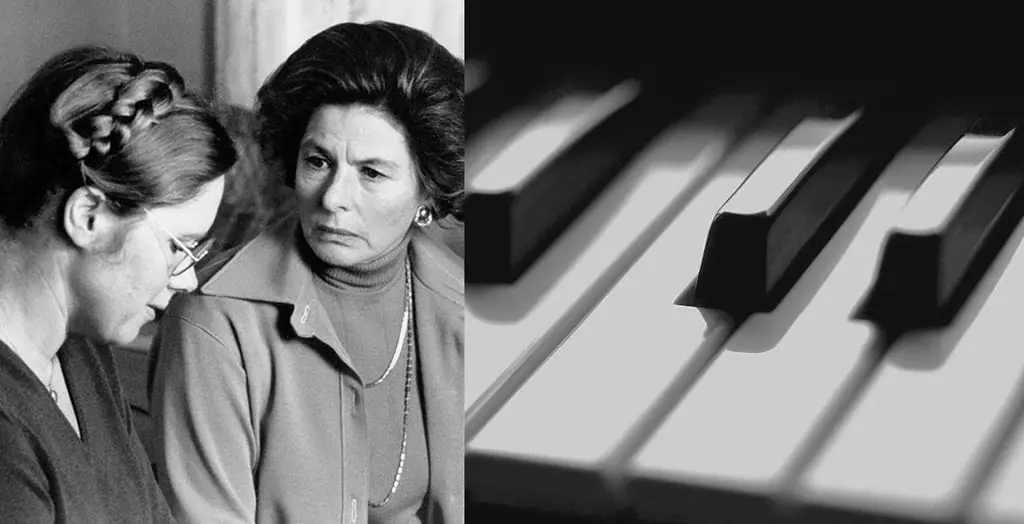
Charlotte asks Eve to play for her. The daughter really wants to play for her mother - the opinion of her mother is very important for her, Eva is terribly worried, feels insecure:
"I'm not ready. I just learned it recently. I couldn't figure it out with my fingers. Technique is also weak for me."
Eva plays diligently, but uncertainly, tensely, without ease, memorized. Charlotte speaks very sparingly about her daughter's game:
“My dear Eve, I am excited. I liked you in your game …
The mother's answer raises an old resentment from the bottom of the soul:
“You didn't like the manner in which I perform this prelude. You think my interpretation is wrong. It's a shame that you found it difficult to explain how you understand this thing."
For Eva, the mother's response is more than her rejection of her interpretation of Chopin, it is her mother's rejection of her anal essence. Here the conflict between Eve and Charlotte is clearly visible: they are different, they feel music differently, they feel life differently. Charlotte teaches her daughter to be skin-tight, she speaks out negatively about her daughter's anal-visual sentimental play:
“Chopin has a lot of feelings and absolutely no sentimentality. Feelings and sentimentality are different concepts. Chopin speaks about his pain wisely and with restraint, collected. The pain is not ostentatious. It subsides briefly and resumes - again suffering, restraint and nobility. Chopin was impulsive, tortured and very courageous. The second prelude should be played improvisationally, without any prettiness and pathos. Disharmonious sounds must be comprehended, but not softened."
The mother shows how to play Chopin, and the whole gamut of her feelings flashes on Eve's face - hatred of her mother for not understanding and accepting her, resentment, reproach.
Decisive scene
The nighttime dialogue between daughter and mother begins with Charlotte's nightmare: she dreams that Eve is strangling her. Charlotte screams in horror, Eve resorts to her mother's cry. The mother is frightened, tries to calm down, asks her daughter if she loves her, to which the daughter replies very evasively: "You are my mother." And then she herself asks: "Do you love me?", because for an anal-visual child, the most important thing is the love of parents, approval, praise. In response, Eve hears a mock: "Of course." Eve is ready for a decisive confession for her, she does not hold back and rebukes her mother: "Not at all!"
Charlotte wonders how Eve can say that after she sacrificed her career for her and her dad at some point ?! To which the daughter sternly replies to the mother that for that it was simply a necessity, and not an expression of feelings, the daughter accuses the mother of betrayal:
“Your back hurt and you couldn't sit at the piano for 6 hours. The audience has grown cold to you. I don’t know what was worse: when you sat at home and pretended to be a caring mother, or when you went on tour. But the further it goes, the clearer it is that you broke the life of both me and dad."
Eva tells how many long evenings she spent with her father, calming and trying to convince him that Charlotte still loves him and will soon return to him, forgetting another lover. She read her mother's letters full of love to her father, in which she talked about her tours:
"We reread your letters several times, and it seemed to us that there was no one better than you in the world."
The daughter's confession scares Charlotte, she sees only hatred in her daughter's words. Eve herself cannot give an unambiguous answer to the question of what she feels towards her mother - just hatred or is there something else … Perhaps love? Or longing for a failed love?
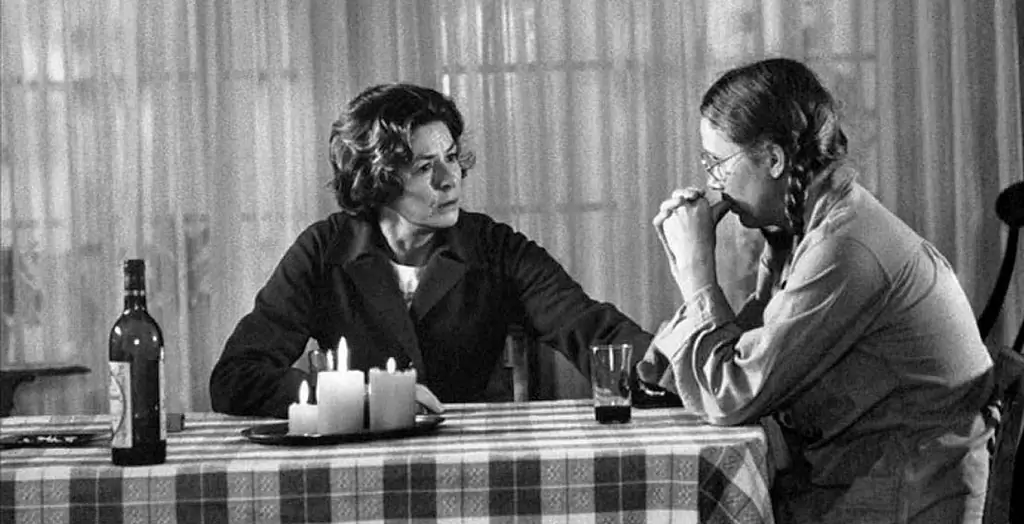
I do not know! I know nothing. You arrived so suddenly, I am glad for your arrival, I invited you myself. I convinced myself that you feel bad, I got confused, I thought that I had matured and could soberly assess you, myself, Helena's illness. And only now I realized how complicated everything is.
Whenever I was sick or just bored you, you took me to the nanny. You locked yourself in and worked. Nobody dared to interfere with you. I stood at the door and listened, only when you took breaks, I brought you coffee and only at these moments I was convinced that you exist. You seem to have always been kind, but you seemed to be in the clouds. When I asked you about anything, you almost never answered. “Mom is terribly tired, better go, take a walk in the garden,” you said.
You were so beautiful that I also wanted to be beautiful, at least a little like you, but I was angular, dull eyes, eyeless, clumsy, thin, arms too thin, legs too long. I was disgusting to myself. Once you laughed: It would be better if you were a boy. You hurt me very much.
The day came when I saw that your suitcases were on the stairs, and you were talking to someone in an unfamiliar language. I prayed to God that something would prevent you from leaving, but you were leaving. She kissed me, on the eyes, on the lips, you smelled amazingly, but the smell was alien. And you yourself were a stranger. You were already on the road, I no longer existed for you.
It seemed to me that my heart was about to stop or burst from pain. Just 5 minutes after you left, how can I endure this pain? I cried on my dad's lap. Dad didn’t comfort me, he just stroked me. He offered to go to the cinema or eat ice cream together. I didn't want to go to the cinema or ice cream - I was dying. So the days passed. Weeks. There was almost nothing to talk about with my father, but I did not interfere with him. Silence reigned at home with your departure.
Before your arrival, the temperature jumped, and I was scared that I would get sick. When you came, my throat was tight with happiness, I could not utter a word. You did not understand this and said: "Eve is not at all happy that mom is at home." I blushed, covered in sweat and was silent, I could not say anything, and I was not such a habit.
In the house, only you always spoke. I will shut up soon, it will become ashamed. And I will listen in silence, as always. I loved you dearly, Mom, but I did not believe your words. Words said one thing, eyes another. As a child, your voice, mom, bewitched me, mesmerized, but all the same, I felt that you were almost always crooked, I could not penetrate the meaning of your words.
And your smile? This was the worst thing. In the moments when you hated dad, you called him "my dear friend" with a smile. When you got tired of me, you said "my dear girl" and smiled at the same time."
Charlotte does not understand her daughter at all, she is really a stranger to her. She listens to her daughter's reproaches with complete misunderstanding:
“You reproach me for leaving and for staying. You don’t understand how hard it was for me then: my back hurt badly, the most profitable engagements were canceled. But in music - the meaning of my life, and then - remorse that I do not pay attention to you and dad. I want to speak out, dot the i's. After one successful concert by the maestro, the conductor took me to a fashionable restaurant, I was in a wonderful mood, and he suddenly said: “Why don't you live at home with your husband and children, as befits a respectable lady, why constantly subject yourself to humiliation?”
Family time
Charlotte recalls the time she returned to her family. She talks about how happy she was in those moments, but Eve unexpectedly confesses to her mother that this time was terrible:
“I didn't want to upset you … I was 14 years old. I grew up sluggish, obedient, and you turned all the energy that nature gave you to me. You got it into your head that no one was involved in my upbringing, and undertook to make up for lost time. I defended myself as best I could, but the forces were unequal. You pestered me with concern, alarmed intonations, not a single trifle escaped your attention.
I hunched over - you imposed gymnastics on me, forced me to do the exercises that you needed. You decided that it was difficult for me to braid, and cut my hair short, and then you decided that I had a wrong bite, and put me a plate. Oh my God, how stupid I looked.
You convinced me that I am already an adult, a big girl and should not wear a skirt and trousers with a sweater. You ordered me a dress without asking whether I like it or not, and I was silent, because I was afraid to upset you. Then you forced me books that I did not understand, but I had to read, and read, read, because you ordered. When we discussed the books we had read, you explained to me, but I did not understand your explanations, I trembled with fear, I was afraid that you would see that I was hopelessly stupid.
I was depressed. I felt that I was zero, insignificant, and people like me, you can neither respect nor love. I was no longer me - I was copying you, your gestures, your gait. Left alone, I did not dare to be myself, because I disgusted myself. I still wake up in sweat when I dream these years. It was a nightmare. I didn't realize that I hate you. I was absolutely sure that we love each other dearly, I did not admit this hatred to myself, and it turned into despair …
I bit my nails, pulled out tufts of hair, my tears choked me, but I couldn't cry, I couldn't make a sound at all. I tried to scream, but my throat couldn't make a sound. It seemed to me that another moment - and I will lose my mind."
The old resentment against the mother for Eve's broken-up first marriage, for the fact that her mother insisted on an abortion, also emerges. In the opinion of the skin-visual mother, Eve did not need an early child, she was not ready for him:
- I told my dad that we must get into your position, wait until you yourself realize that your Stefan is a complete idiot.
- Do you think you know everything? Were you there when we were with him? You undertake to judge people, but you have never been interested in anyone but yourself. - If you wanted a child so, you would not agree to an abortion.
- I was weak-willed, it was so scary. I needed support.
- I was completely sincerely convinced that it is too early for you to have a child.
The daughter's confession is incomprehensible and unpleasant for Charlotte: "You hated me, why did you not tell me anything over the years?" And she absolutely did not care about the mental state of her daughter.
Eve tries to explain everything to her mother: “Because you are not capable of compassion, because you do not see what you don’t want to see, because Helena and I are disgusting to you, because you are locked in your feelings and experiences, dear mother, because I loved you because you thought I was unlucky and incapable. You managed to destroy my life, because you yourself were unhappy, you trampled on tenderness and kindness, choked all living things that came your way …
I hated you, you hated me no less. You still hate me. I was small, affectionate, I was waiting for warmth, and you entangled me, because then you needed my love, you needed delight and worship, I was defenseless before you.
You tirelessly insisted that you love dad, Helen, me, and you knew how to portray the intonations of love, gestures … People like you are dangerous to others, you must be isolated so that you could not harm anyone. Mother and daughter - what a terrible interweaving of love and hatred, evil and good, chaos and creation … and everything that happens is programmed by nature. The daughter's hands are inherited by the mother, the mother has collapsed, and the daughter will pay, the mother's misfortune must become the daughter's misfortune, it's like an umbilical cord that has been cut but not torn. Mom, is my grief really your triumph? My trouble, does it make you happy?"
Charlotte's daughter's confession evokes one desire in Charlotte - to defend herself, to arouse sympathy for herself … She only "sways visually" in response to the fact that she herself does not remember her childhood at all, does not remember that at least once someone hugged or kissed her … That she was not punished, but never caressed.
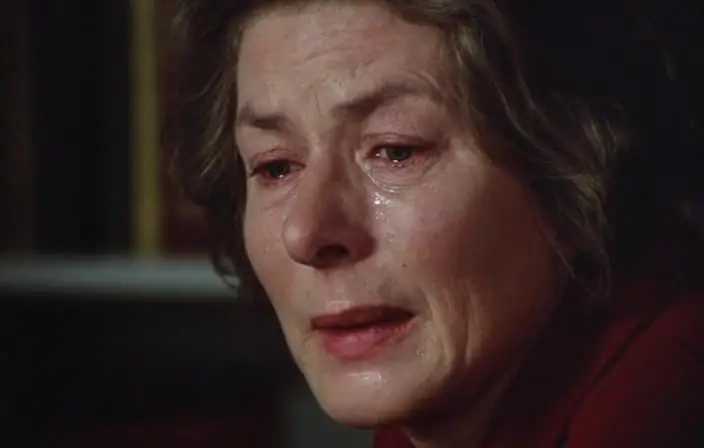
“Neither my father nor my mother showed me neither love nor warmth, we had no spiritual understanding. Only music gave me the opportunity to express everything that had accumulated in my soul. When I am overcome by insomnia, I reflect on how I lived, how I live. Many people I know do not live at all, but exist, and then fear grips me, I look back at myself, and the picture is unattractive.
I haven't matured. The body has grown old, I gained memories and experiences, but in spite of this, I did not seem to be born, I do not remember anyone's faces. I can’t put everything together, I don’t see my mother, I don’t see your face, I don’t remember the birth, neither the first nor the second, it hurt, but besides the pain, what? I do not remember…
Someone said that “a sense of reality is an invaluable, rare talent. Most of humanity does not have it, fortunately. " I was shy in front of you, Eva, I wanted you to take care of me, so that you hug me, comfort me. I saw that you loved me, but was afraid of your claims. There was something in your eyes … I didn't want to be your mother. I wanted you to understand that I am also weak and defenseless."
Eve's mother's answer is not satisfied, and she pronounces her sentence on her:
“You continually abandoned us and rushed to get rid of Helena when she became very ill. One truth in the world, and one lie, and no forgiveness. You want to find some excuse for yourself. You think you've begged life for special perks. No, in its contract with people life does not give any discounts to anyone. It's time to understand that you are in the same demand as other people."
Frightened Charlotte seeks support and protection from her daughter: “I made a lot of mistakes, but I want to change. Help me. Your hatred is so terrible, I was selfish, I did not realize, I was frivolous. Hug me, well, at least touch me … help me. " The daughter does not reach out to her mother, leaving her alone with herself, alone with her conscience, as it seems to Eve (through herself and her anal vector, Eve hopes that the mother also has a "conscience").
After this conversation, Charlotte hastily leaves. He leaves without any feeling of remorse, perhaps even with a feeling of irritation. She doesn't need her daughter's forgiveness. She doesn't feel guilty. All her thoughts are already focused on something else - future concerts:
“The critics have always treated me with sympathy. Who else performs Schumann's Concerto with this feeling? I am not saying that I am the first pianist, but also not the last …
Looking at the village that flashed through the window, Charlotte says thoughtfully: “What a nice village, the family gathers at the family table. I feel superfluous, I yearn for home, and when I return to the house, I understand that I miss something else."
Eve does not feel any relief and release after talking with her mother: “Poor mother, she broke off and left, as she immediately grew old. We will never see each other again. I have to go home, cook dinner, commit suicide, no, I cannot die, the Lord will need me someday. And he will release me from his dungeon. Eric, are you with me? - Eve turns to her early dead child. "We will never betray each other."
After her mother left, Eva suffers, almost does not sleep. She believes that she kicked out her mother, and cannot forgive herself for this. Confused completely, Eve writes a new letter to her mother:
“Dear mother, I realized that I was wrong, I demanded too much of you, I tortured you with my hatred, which had long faded away. I apologize to you. The hope that my confession is not in vain does not leave me, because there is mercy, kindness and incomparable happiness to take care of each other, help and support. I will never believe that you are gone from my life; Of course you will come back, it’s not too late, Mom, it’s not too late.”
And it is never too late to understand yourself and loved ones. Only the sooner we do this, the better for us and for them. You can understand the psychological characteristics of movie characters and real people who surround us in everyday life at the training "System-vector psychology" by Yuri Burlan. Registration for free online lectures by link.






